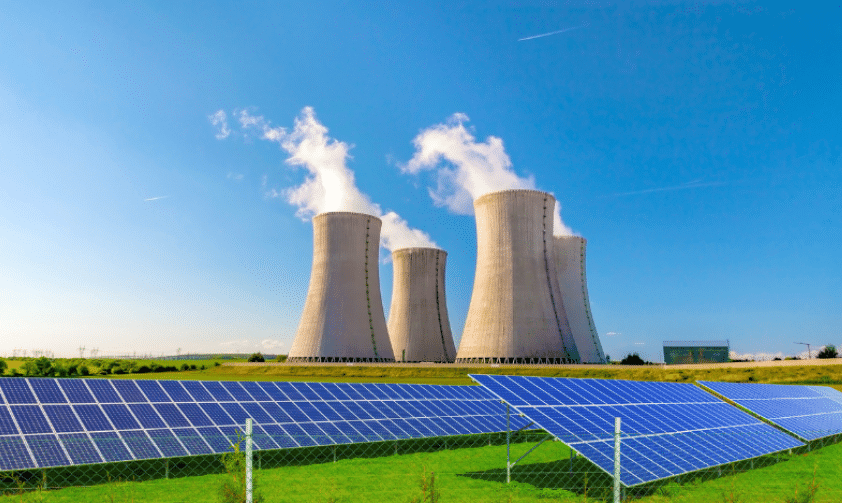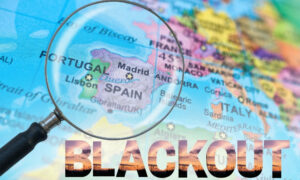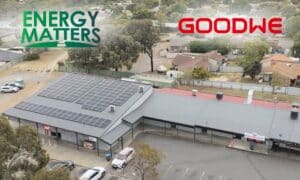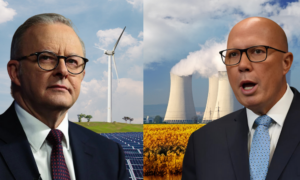Australia is a country rich in natural resources – not least uranium. It’s no surprise that the debate around nuclear power has been raging on and off again for decades. Proponents of nuclear energy claim it’s the only option for clean and reliable electricity. But is this true? In this article, we will explore whether nuclear power in Australia makes sense and wade through some of the arguments that have been made for and against it.
Are you looking to save money on your electricity bills and reduce your carbon footprint? Solar energy is the perfect solution! Energy Matters can help you get up to 3 FREE solar quotes from pre-qualified and vetted solar firms in your area.
Energy Matters has been a leader in the renewable energy industry since 2005 and has helped over 40,000 Australian households in their journey to energy independence. With Energy Matters, you can be sure you’re getting the best possible deal on solar energy. We only work with reputable solar firms with a proven track record of delivering high-quality solar systems.
Australia and nuclear power: An age-old debate
Australia has never built a nuclear power station, and we are not currently planning any. In fact, it isn’t a legal option – they are banned in every state and territory. However, we do have 33% of the world’s uranium deposits and we are the world’s third-largest producer after Kazakhstan and Canada. So, the question of whether or not to introduce nuclear power into Australia is a perennial one.
In October last year, the announcement that Australia and the US reached a deal for the funding of a fleet of new nuclear-powered attack submarines for patrolling the Indo-Pacific reignited the age-old debate between the pro- and anti-nuclear energy lobbies in Australia.
For those who back nuclear power, the advantages are clear: it doesn’t produce greenhouse gases like other forms of energy generation, such as coal; it’s reliable, meaning a steady supply of electricity is assured; and it has a high energy density.
The anti-nuclear lobby has many concerns, chief among them being the potential for accidents that could cause widespread contamination (think Chernobyl and Fukushima), and the waste products that are generated, which are radioactive and remain hazardous for tens of thousands of years. There’s also the concern that it’s an expensive distraction from investment in proven renewable energy technologies like wind, solar and hydropower.
Earlier this month the Climate Council stepped forward and claimed that nuclear power doesn’t make sense for Australia and probably never will. On the opposite side of the debate, Professor Martin Freer, a nuclear physicist at the University of Birmingham claimed that nuclear power is a solution to the looming threat of climate change and the imperative to wean off fossil fuels.
Arguments about nuclear power tend to be highly emotive, with each side accusing the other of putting ideology before science. So who is right?

What is nuclear power?
Nuclear power isn’t just a made-up energy source for the city of Springfield, although we won’t blame you if you’re picturing Homer Simpson falling asleep at the controls of a nuclear reactor!
Nuclear power is generated by splitting uranium atoms in a process called fission. When these atoms are split, they release huge amounts of energy in the form of heat. This heat is used to generate steam, which turns turbines and generates electricity.
Nuclear vs. renewables
When it comes to the race towards a clean energy future in Australia, nuclear hasn’t even had a seat at the table due to our ban on nuclear power plants.
Today the focus of our energy policy is firmly on renewables. We have some of the best wind and solar resources in the world, and we’re making good use of them. Read more about Australia’s Love of Solar Panels is Helping Keep Interest Rates Low.
While public opinion on nuclear power has been softening in recent years, the idea of building new nuclear reactors is still a tough sell. This is largely due to the high cost, safety concerns and long-term waste storage issues.
So, does that mean we should forget about nuclear power? Below we will explore several of the key arguments across the debate.

Sustainability
While nuclear power is certainly a cleaner option than some other forms of energy generation such as gas and coal, it isn’t a renewable energy source. Once all the uranium has been mined, there’s no way to generate more – unlike solar or wind, which can be harnessed indefinitely.
Also, while no greenhouse gasses are created in the operation of a nuclear reactor, the mining, processing and transport of uranium and the generation of nuclear waste all produce large amounts of carbon dioxide.
Time and cost
Nuclear power plants cost a lot to build, and the process of getting them up and running takes a long time. There are the initial capital costs to consider, as well as the cost of maintaining and decommissioning the plant at the end of its life. Then there’s the question of what to do with the radioactive waste. Safe storage and disposal facilities don’t come cheap.
The CSIRO’s GenCost 2021-22 report claims that, by a long mile, the lowest cost way of producing electricity in Australia is with solar and wind even when factoring in storage. Renewables are getting cheaper all the time, with wind and solar now cost-competitive with fossil fuels in many parts of the world. In contrast, the costs of building and operating nuclear in Australia remain prohibitively high.
Timing is also a critical factor here – given the urgency of climate change, we need effective solutions now. Research from the World Nuclear Association shows that nuclear power stations take an average of 9.4 years to build – compared to 1–3 years for a major wind or solar project.
Risks and hazards
As we’ve seen from the Chernobyl disaster in 1986 and the Fukushima nuclear meltdown in 2011, nuclear power comes with an undeniable risk of disaster. These accidents had a devastating impact on the local environment and population.
The storage and disposal of nuclear waste also pose a serious risk. Waste from nuclear power plants is highly radioactive and very difficult to dispose of safely. It can take up to 100,000 years for it to become safe. There is currently no agreed international solution for the long-term storage of high-level nuclear waste.
Renewable technology, in contrast, is generally considered safe. There have been very few accidents involving renewables and, although solar waste is a concern, panel manufacturing is adopting greener practices and robust panel recycling and upcycling strategies are already underway in Australia.
Reliability
There’s no doubt that nuclear is a very reliable form of energy generation, providing a steady “baseload” of power. A reliable supply of electricity is assured, which is especially important for countries with large populations and economies like Australia.
Proponents of nuclear energy will be quick to point out the variability of renewables. Indeed, the sun doesn’t always shine and the wind doesn’t always blow, but there’s more to the story.
We now have the technology to store energy from wind and solar when it’s not needed, and to draw on this storage when demand is high. Large-scale battery storage is becoming increasingly affordable and efficient, so the intermittency of wind and solar is no longer the major obstacle it once was.
Besides, reliability is not a function of individual generation technologies, but a function of the electricity system as a whole. It is important to remember that “renewable energy” is not a single energy source, but roughly speaking six: solar, wind, biomass, geothermal, hydro, and ocean. Of these, only wind and solar are “variable;” the rest are capable of being dialed up or down when needed.
The decentralisation of renewables also makes it a very resilient source of energy. If there was a problem with a nuclear plant in Sydney, it would have a knock-on effect on the entire grid. In contrast, if there was a problem with a wind or solar farm in rural NSW, it would have little impact on the rest of the grid.
Unleash the potential of solar battery storage! Are you ready to transform the way you power your business or household? Say goodbye to rising electricity costs and unpredictable energy grids. The state-of-the-art solar battery systems empower you to maximise energy efficiency, save money, and reduce your carbon footprint while enjoying an uninterrupted power supply.
Let us discuss and choose the best quote that suits your needs and budget, and we can connect you with our trusted local installers, who will provide up to 3 FREE quotes for your business solar and home battery system.
Weighing the nuclear energy’s advantages and disadvantages
As Australia strives towards a clean energy future, the nuclear power debate has reignited. Proponents tout its low-carbon footprint and reliable baseload generation, while opponents raise concerns about safety, waste disposal, and proliferation risks. To answer the question of whether nuclear power is a good idea for Australia, a balanced assessment of its advantages and disadvantages is crucial.
Advantages of nuclear energy
- Carbon-free electricity: Nuclear power plants produce essentially no greenhouse gases during operation, significantly reducing Australia’s carbon footprint and contributing to climate change mitigation goals.
- Reliable baseload power: Unlike wind and solar, which depend on weather conditions, nuclear power plants continuously generate electricity, providing a stable and reliable source of baseload power for the grid.
- High energy density: Nuclear fuel is incredibly energy-dense, requiring minimal space for storage and transportation compared to conventional fuels like coal or gas.
- Technological advancements: Small modular reactors (SMRs) offer a safer, more scalable, and potentially cheaper solution than traditional large-scale reactors.
- Economic and job creation: Building and operating nuclear power plants could create significant employment opportunities throughout the construction, operation, and maintenance.

Disadvantages of nuclear energy
- Safety concerns: Accidents like Chernobyl and Fukushima have left a strong public perception of nuclear power as inherently dangerous. While modern reactor designs are significantly safer, the potential for catastrophic accidents remains a concern.
- Waste disposal: Radioactive waste has a long half-life and requires safe and secure storage for thousands of years, posing ethical and technical challenges.
- Proliferation risks: Enrichment of uranium used in nuclear fuel can also be used for weapons, raising concerns about nuclear proliferation.
- High upfront costs: Building and commissioning nuclear power plants require significant upfront investment before generating returns.
- Public and political opposition: A strong anti-nuclear lobby exists in Australia, raising concerns about public acceptance and potential political hurdles.
So, is nuclear power in Australia a good idea?
At the end of the day, the issue isn’t so much about the merits of nuclear power in and of itself but more on the logic of pursuing it when Australia has abundant and cheap renewable resources like solar and wind.
Considering nuclear power as an option requires a complete rethink of our approach to climate change and energy policy. It would be an expensive and time-consuming process, with no guarantee of success – and failure isn’t an option.
As we face an increasingly urgent need to take action on climate change, we must focus on solutions that are scalable, cost-effective, and safe. According to the Climate Council, Australia is one of the sunniest and windiest countries on earth, with enough renewable energy to power resources to power our country 500 times over. Compared to nuclear power plants, we can build large-scale wind and solar farms in Australia cheap and fast.
Frankly, pursuing nuclear is just a waste of time and resources in Australia’s race against climate change. We need to focus on renewable energy if we’re going to make a dent in our emissions.
Let’s not get distracted by the nuclear debate.
Have you made the switch to solar power?
Rooftop solar has taken the country by storm in recent years. As of 9 November 2021, more than 3 million rooftop solar PV systems have been installed across Australia.
You may be wondering if solar is still worth it in 2022 – after all, feed-in tariffs are low and rebates aren’t as generous as they once were. The answer is a resounding yes. Solar is still worth the investment for the overwhelming majority of Australians.
With a payback period of 2-5 years on the upfront cost, homeowners will not only enjoy significant savings on their energy bills over the lifespan (25-30 years) of their system but also increase the value of their home while reducing their carbon footprint.
The key to a good investment is to find a reliable solar installer who offers high-quality solar panels, excellent service and great aftermarket support.
If you’re looking to make the switch, we can help. We only partner with solar providers that we trust to deliver quality products and services, so you can be sure that you’ll be looked after for the long haul.
Take our quick solar quiz for up to 3 obligation-free solar quotes from trusted local installers. It’s fast, it’s free and you’ll be well on your way to reaping the benefits of a great investment now and for many years to come.
Now is the right time to switch to solar energy. We recommend seeking at least 3 solar quotes to ensure that you are getting the best deal and selecting the right solar installer whom you can trust. With this, you can guarantee a solar system in sydney that meets your energy needs.












































